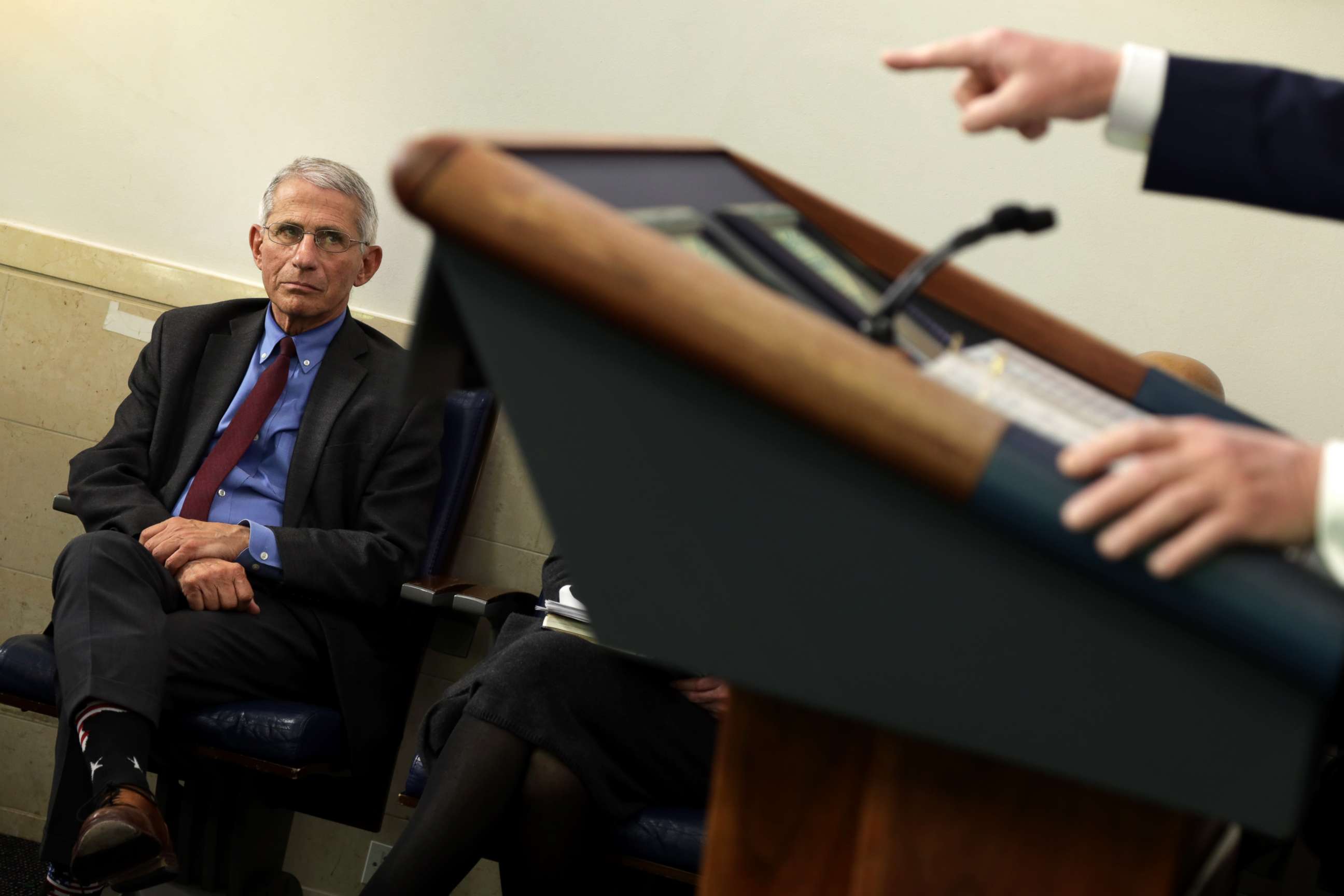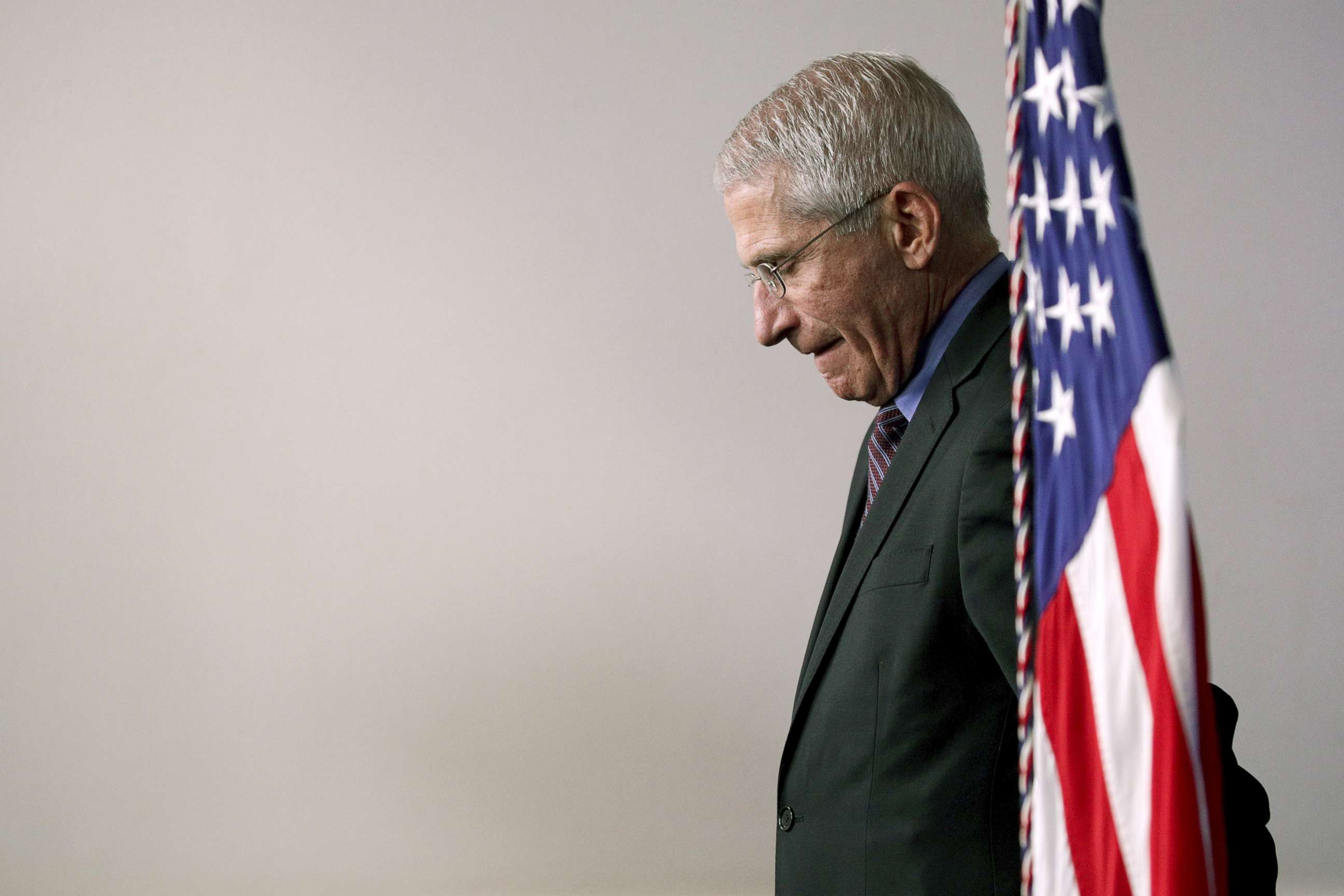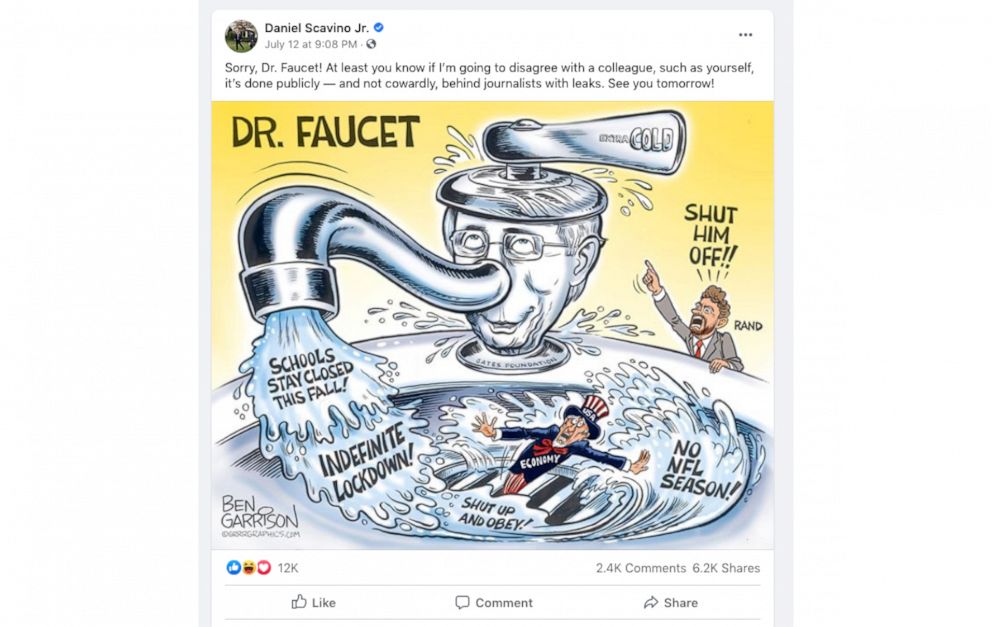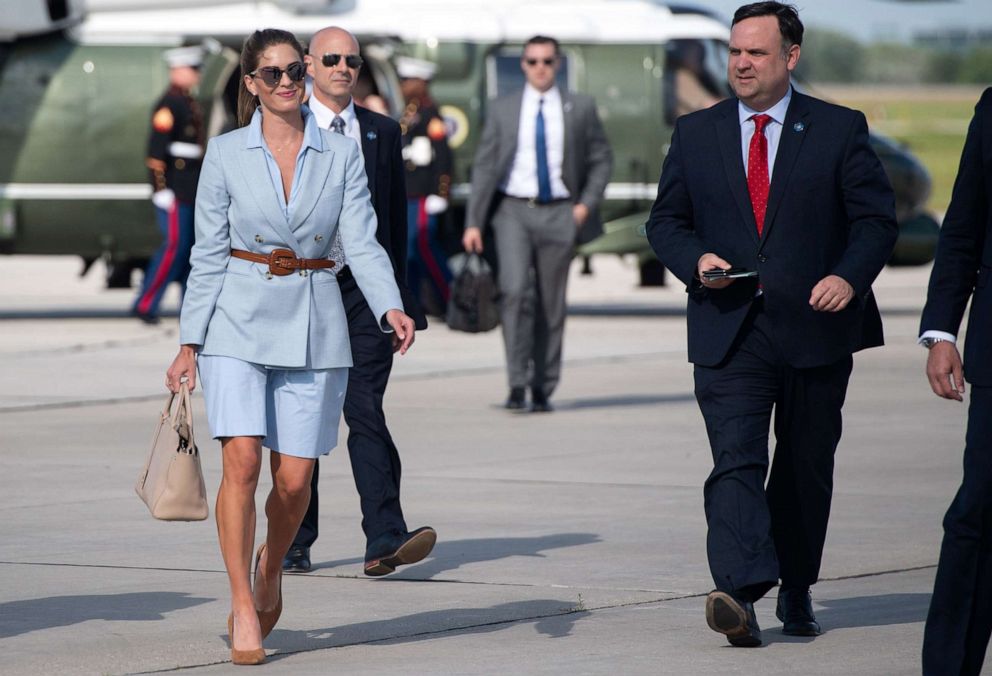Doctors cry foul as White House targets Fauci, CDC
A top Trump aide posted a cartoon mocking Fauci.
As top White House officials criticized the nation's leading infectious disease expert, Dr. Anthony Fauci -- including a top aide sharing a mocking cartoon -- four former directors of the Centers for Disease Control and Prevention have penned an op-ed warning that "undermining" science and the "willful disregard for public health guidelines" is "leading to a sharp rise in infections and deaths" from the novel coronavirus.
"The four of us led the CDC over a period of more than 15 years, spanning Republican and Democratic administrations alike," Tom Frieden, Jeffrey Koplan, David Satcher, and Richard Besser wrote in an op-ed published Tuesday in The Washington Post. "We cannot recall over our collective tenure a single time when political pressure led to a change in the interpretation of scientific evidence."
Trump has pressured the CDC to change guidelines for schools, a move the four former CDC directors called "extraordinary." They praised the CDC's experts.

"Unfortunately, their sound science is being challenged with partisan potshots, sowing confusion and mistrust at a time when the American people need leadership, expertise and clarity," the former directors, who served under both Republican and Democratic presidents, wrote.
The unusual repudiation came as the White House sought to discredit Fauci, who has provided a more blunt and sobering assessment of the state of the epidemic than the president and his top aides have sought to project -- one they see as politically inconvenient as Trump campaigns for re-election.
The day before, Trump shared a message on Twitter accusing doctors and the CDC of "lying" in order to influence the November election; he provided no evidence and did not elaborate.
The criticism fit a pattern of the Trump administration minimizing public health experts and prioritizing an economic recovery, which the president sees as key to his reelection chances.
Over the weekend, the White House provided several media outlets with a misleading list of comments made by Fauci, in an effort to undercut him.

The White House on Monday then tried to deny there was a behind behind-the-scenes campaign to discredit the nation’s leading infectious disease expert.
“There is no opposition research being dumped to reporters. We were asked a very specific question by the Washington Post, and that question was President Trump noted that Dr. Fauci had made some mistakes, and we provided a direct answer to what was a direct question,” McEnany said.
But despite the denial of a privately waged smear campaign, one of the president’s top aides made no effort to hide his disdain, airing criticism of Fauci in plain view on social media.
White House Director of Social Media and Deputy Chief of Staff for Communications Dan Scavino, who has been by the president’s side since the 2016 campaign, posted a cartoon depicting Dr. Fauci as a running faucet washing the U.S. economy down the drain on Facebook.
“Sorry, Dr. Faucet! At least you know if I’m going to disagree with a colleague, such as yourself, it’s done publicly — and not cowardly, behind journalists with leaks. See you tomorrow!” Scavino wrote in a caption accompanying the cartoon.

Further countering the White House contention that there is no concerted campaign to undermine Fauci, one of the president’s informal outside advisers, conservative economist Stephen Moore, told The Daily Beast on Monday that he is working on a more detailed memo titled “Dr. Wrong” for the White House with the express purpose to "go after Fauci."
“We are working on a memo that shows how many times Dr. Fauci’s been wrong during not just [this pandemic], but during his entire career,” Moore told The Daily Beast, who works at the Committee to Unleash Prosperity.
According to The Daily Beast, Moore said he intends to send the final product to the president’s desk to “publicize it.”
On Monday, Trump himself shared a tweet disparaging Fauci -- misconstruing a months-old comment Fauci had made -- before telling reporters later in the day that he liked Fauci "personally," had "a very good relationship" with him, and considered him "a very nice person."
But, he added, "I don't always agree with him."
While the president and White House have sought to downplay the appearance of conflict that they have directly stoked, Dr. Fauci has been increasingly sidelined within the task force. He is no longer a regular presence at task force briefings with the media led by the vice president, he was not a participant on the vice president’s weekly call with governors on Monday, and it’s been two months since Fauci says he has personally briefed the president.

Though it’s been many weeks since Fauci met with the president, he did come to the White House the day after officials released anonymous information to disparage him for a meeting with Chief of Staff Mark Meadows, officials confirmed.
Adm. Brett Giroir, the Trump administration’s testing czar and another top member of the task force, was questioned on NBC's "Today" program Tuesday about the White House’s attack on Fauci. Instead of refuting the memo in defense of his colleague, Giroir seemed to concede to the points and “none of us are always right, that’s just the way things are.”
“Look none of us are always right and we admit that I think we have a good relationship. The vice president listens to us all, we meet regularly during the task force. We’re just going to keep our heads down and keep working together,” Giroir said. “None of us are always right, that’s just the way things are, that’s why we work together and will continue to do so.”
And despite the surge of coronavirus cases in much of the country, Girior instead expressed cautious optimism about where the country stands in the fight against the virus, saying there are “early indicators we’re turning the corner” and that “we are seeing some early light at the end of this tunnel.”
Polls have shown Americans trust Fauci on coronavirus significantly more than they trust Trump. In one conducted by Fox News last month, 72% of Americans approved of Fauci's response to the pandemic, while 44 percent approved of Trump's; the president's approval was even lower, 33%, in an ABC News/Ipsos poll conducted last week.
As the White House has sought to disparage Fauci, he has found support not just from the public health community and Democrats, but from within Trump's own party.
Rep. Michael Burgess, R-Texas, a doctor who worked as an obstetrician-gynecologist before entering politics, told the Dallas Morning News he didn't think it was "particularly useful be critical of someone who is working in this space and doing the very best they can to try to help the country through a very, very tough infectious disease problem."
The Association of American Medical Colleges on Monday also issued a statement strongly supporting Fauci, saying it was "extremely concerned and alarmed by efforts to discredit Anthony Fauci, MD, our nation’s top infectious disease expert."
"As we are seeing from the surge in COVID-19 cases in areas that have reopened," the association's top officials wrote, "science and facts—not wishful thinking or politics—must guide America’s response to this pandemic."
"America should be applauding Dr. Fauci for his service and following his advice," they added, "not undermining his credibility at this critical time.”
ABC News' Ben Siegel, Anne Flaherty and Gary Langer contributed to this report.




